Did you know that most cats are “sweet blind” and cannot taste sweet treats like honey? Honey has caught the attention of pet owners, who often wonder if it’s safe for their cats. Although not toxic, the risks of giving honey to cats may be more than its benefits.
Honey is not ideal for cats because of its high sugar. This natural sugar can cause gastrointestinal problems, obesity, and a higher diabetes risk. But, if you decide to give it, choose raw Manuka honey for its antibacterial properties. Stay away from processed honey, it only brings empty calories and fillers that cats don’t need.
Can Cats Eat Honey?: Key Takeaways
- Most cats are “sweet blind” and cannot taste sweet treats like honey.
- Honey contains natural sugar that can lead to gastrointestinal issues, weight gain, and an increased risk of diabetes in cats.
- Raw Manuka honey is suggested if giving honey to cats due to its antibacterial benefits.
- Processed honey lacks health benefits and is filled with empty calories and fillers unnecessary for cats.
- Kittens should not be given honey due to difficulties in swallowing, bacterial spores, and susceptibility to botulism.
Vets Don’t Recommend Feeding Honey to Cats
Cats are pure meat eaters, so they don’t need sugar in their diet. Plus, most cats can’t even taste sweet things. Veterinarians worry about honey’s impact on cats. Since cats can’t fully digest sugars, honey might lead to health problems. These problems might include stomach issues, more weight, and even diabetes. That’s why vets don’t advise giving honey to your cat.
When deciding on your cat’s diet, vets consider its health and history. A balanced, vet-recommended diet is best for most cats. Occasionally, you can give them treats or a little unsalted chicken for fun.
Cats are Obligate Carnivores
Cats are strict meat eaters and don’t need sweet foods. They cannot taste sugary treats much either.
Honey Has High Sugar Content
The main sugars in honey are hard for cats to break down. Since cats are meat-eaters, honey might not be the best food for them. In the U.S., many cats are too heavy. It’s key to watch what they eat and limit sugary foods like honey.
Potential Gastrointestinal Issues
While honey isn’t poisonous to cats, it’s still not the best choice. Cats’ digestive systems are built for meat. This means honey could cause problems like tummy aches or vomiting. Young cats can get very sick from certain bacteria in honey. So, it’s important to keep honey away from them to stay safe. For diabetic cats, honey’s sugar is especially risky. It could make their condition worse. It’s better to use other ways to help your cat if it has health problems.
Can Cats Eat Honey?
Cats, in general, don’t like honey. They are carnivores and can’t taste sweetness. They prefer foods with high fat content. So, if you see your cat enjoying ice cream, it’s the fat they love, not the sugar.
If you think about giving honey to your cat for health reasons, choose wisely. Manuka honey or raw, local honey in small amounts could be okay. Give them no more than half a teaspoon a day to avoid upset stomachs. But, it’s always smart to check with your vet first before adding honey or any new food to their diet.
Nutritional Profile of Honey
Honey is a natural antioxidant that boosts the immune system. It also has antibacterial properties, making it popular with homeopaths. Raw manuka honey is especially good at killing germs, useful for treating wounds. However, honey might not help much with cat allergies because it’s high in sugar and calories. But, using raw honey as a temporary allergy aid or on wounds may be okay for cats. Just make sure it’s raw honey. Unpasteurized honey is the healthiest choice, but more studies are needed to be certain. Avoid honey with added sugar and corn syrup, which is not good for cats.
High in Carbohydrates and Calories
Since honey is high in sugar and calories, it’s not a good snack for most cats. Cats don’t need sugar; they are obligate carnivores.
Low in Protein and Fats
Honey lacks the protein and fat that cats need in their diets. It’s mostly carbohydrates without essential feline nutrients. For this reason, honey is not a good dietary choice for cats.
Risks of Feeding Honey to Cats
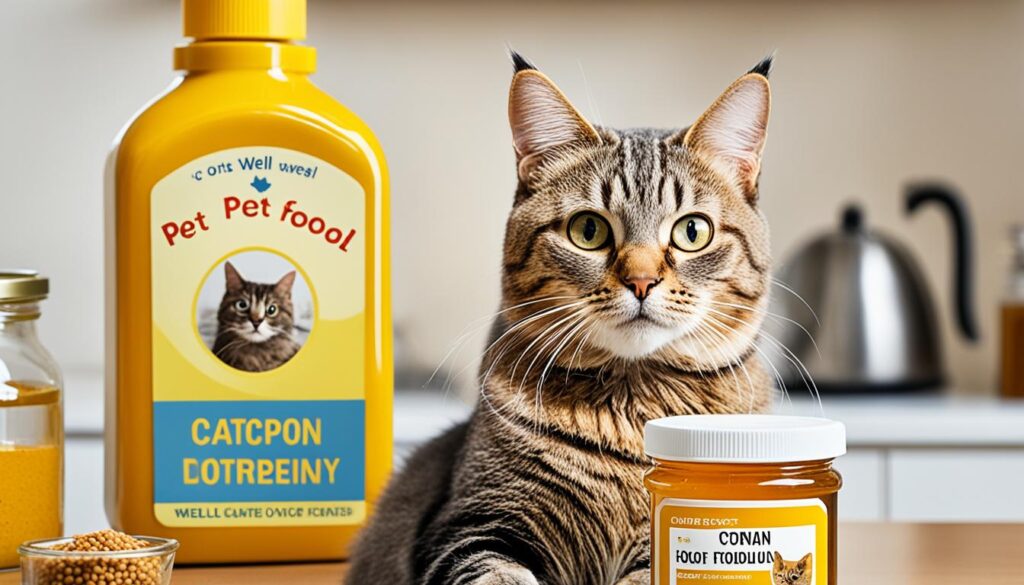
Though honey might look like a sweet treat, think twice before giving it to your cat. It’s not a fix for things like allergies or throat pain in cats. In fact, giving honey to your cat can be more bad than good, especially if given daily.
Gastrointestinal Distress
Because of its high sugar, honey can upset your cat’s stomach. This might show as gagging, throwing up, or having a runny tummy if they eat too much. Cats can’t easily break down the sugars in honey, which can lead to stomach issues.
Weight Gain and Obesity
Each 20-gram serving of honey packs in 61 calories. These calories mainly come from fructose and glucose. If cats eat honey often, they might start putting on weight. This could even lead to them being obese. Feeding them too much honey can add unhealthy fat without helping their muscles.
Increased Risk of Diabetes
Too much sugar from honey can up a cat’s chance of getting diabetes. Cats do not taste sweetness like we do. Without this taste, they aren’t set up to handle honey’s sugars well either. Eating too many sugary things can make cats more likely to get diabetes.
Some say honey has good qualities, like fighting bacteria and inflammation. But, giving your cat honey is usually more risky than helpful. It’s smarter to keep your kitty on a diet the vet recommends. Stay away from honey and sugary snacks to keep your pet healthy.
Potential Benefits of Honey for Cats
Honey is known for its antibacterial and anti-inflammatory qualities in human health. This sweet nectar has found its way into the diets of some cats. It’s used as a possible home remedy for issues like diabetes mellitus, anorexia, allergies, and wound healing. However, there isn’t enough scientific proof that it helps with these conditions in cats.
Some people believe honey can help with cat allergies, making itchy eyes and throat, paw swelling, and red skin a bit better due to its anti-inflammatory nature. But, there’s no firm scientific evidence available yet.
In humans, honey’s antioxidants can help heal wounds. Yet, these benefits aren’t seen in cats. Manuka honey, which is known for being medically beneficial, is used in treating cat wounds. Still, it’s smart to check with a vet before applying any treatments to your pet.
Honey as a Remedy for Feline Conditions
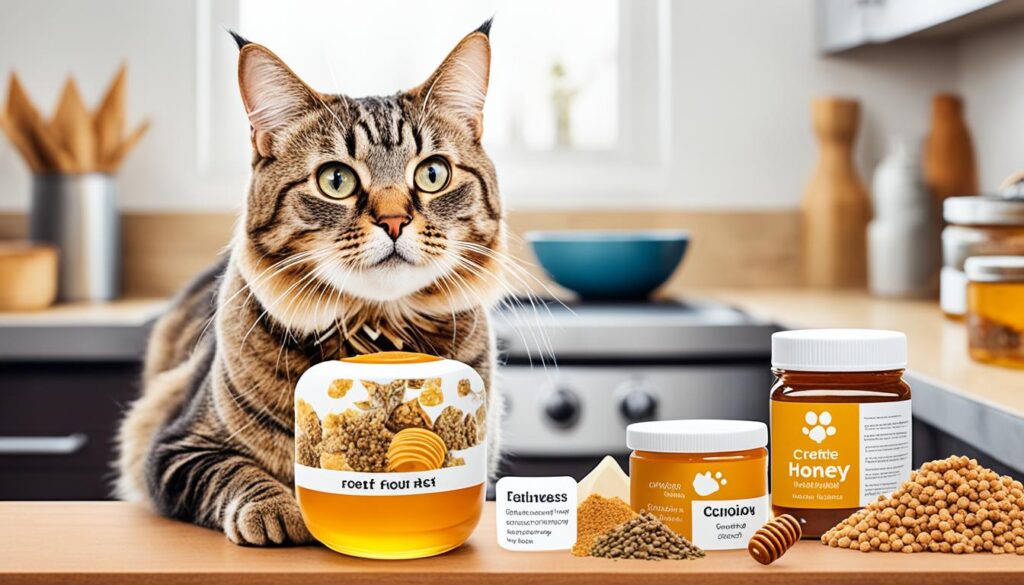
Diabetic cats lack insulin, which affects food energy conversion. They are always hungry. Some owners give them honey or carb snacks for a quick energy boost.
Such a move is risky. Feline diabetes needs prescription meds and a special diet. Home remedies might lead to serious problems.
Anorexia and Weight Gain
Honey does pack on weight in cats, but it’s not healthy. Too many carbs can turn into fat. This can make your cat’s fat level rise but not their muscle.
Choose high-protein foods for them, like meat and fish, to really help them gain muscle weight.
Allergy Relief
Cats can be allergic to many things. Signs include breathing issues and skin problems. While honey is known for helping people, it’s unclear if it does the same for cats.
Untamed’s wet food is 60% high quality meat. It’s designed to be free from common allergens, promoting better digestion and health.
Wound Healing
Indeed, honey, especially raw types, has proven its worth for wound care, even in cats. But, more studies are needed to fully endorse using honey in cat wound care.
Untamed boasts a variety of products. They make trying new food easy, with benefits like monthly delivery and free shipping.
Types of Honey and Their Suitability for Cats
Not all honey is good for cats. Raw honey is the best. It has lots of health benefits. But, we need more studies on how it affects cats. Make sure to choose the most natural honey. Some store-bought honey has bad stuff like sugar. This can harm cats.
Raw Honey
Raw honey is the top choice for cats. It hasn’t been changed or filtered. Because of this, it has good bacteria and helpful chemicals. Cat’s diets can get better with it, only a little bit.
Manuka Honey
Manuka honey is from New Zealand and Australia. Bees make it from the manuka bush. It’s really good at fighting bad germs. Plus, it helps fight swelling and bad stuff in the body. Some vets use it to help cats heal.
Processed Honey
Stay away from processed honey for cats. It doesn’t help their health. It’s like giving them junk food. They won’t get much nutrition from it.
Precautions and Limitations
Kittens, especially, should avoid honey. Their small throats and stomachs find it hard to handle. Honey can contain bacteria that their young immune systems can’t fight off. Kittens might get botulism from honey. It’s a serious illness from a certain bacteria that makes poison. While honey won’t kill your cat, it isn’t a good treat. Stick to what your vet recommends. Treat them with plain meat or approved snacks. Cats mostly eat meat, unlike us.
Botulism Risk
Too much honey can give a cat tummy troubles. There’s also a very small botulism risk. Honey has caused botulism in infants before. So, give honey to cats only occasionally. Keep it to a small amount.
Conclusion
While honey isn’t toxic, its sugar is not good for most cats. Cats can’t taste the sweet in honey like humans. It’s just extra, useless sugar for them. Some cat owners might still offer honey sometimes. They see benefits in special honey types like Manuka or raw honey. But, it’s wise to check with a vet first if you plan to do this. This helps to avoid unexpected health issues.
If you’re looking to give your cat a nice treat, think beyond honey. A bit of boiled chicken, a cat’s natural preference, is a much better option. Since cats don’t need carbs, eating too much honey can make them gain weight. This could lead to health problems, like being too heavy or obese.
It’s smartest to give your cat food that the vet recommends. Leave the honey for your own snacks. This way, your cat stays healthy and happy, which is what matters most.
FAQ
Can cats eat honey?
Why is honey not good for cats?
What type of honey is best for cats?
Can honey help cats with allergies or other conditions?
How much honey can I give my cat?
Is honey safe for kittens?
What are the alternatives to feeding honey to my cat?
References
| International Cat Association (TICA) | https://www.tica.org/ |
| The Cat Fanciers’ Association (CFA) | https://cfa.org/ |
| World Cat Federation (WCF) | https://www.wcf-online.de/ |
| Fédération Internationale Féline (FIFe) | https://www.fifeweb.org/ |

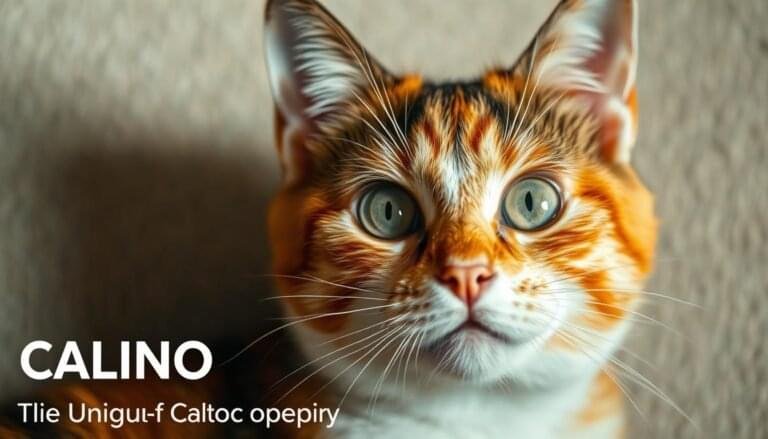
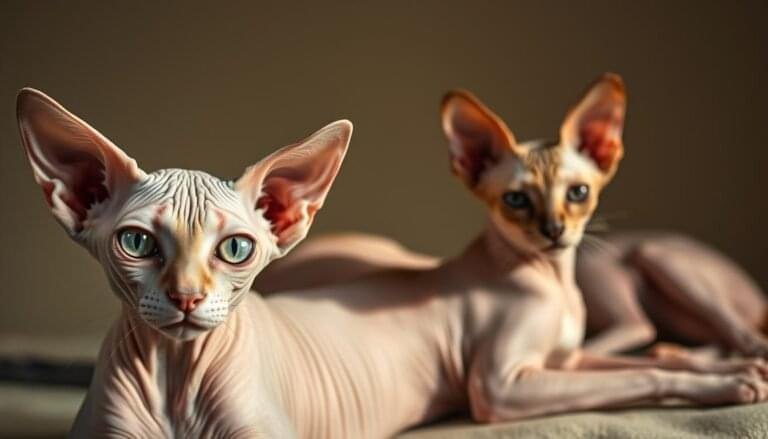
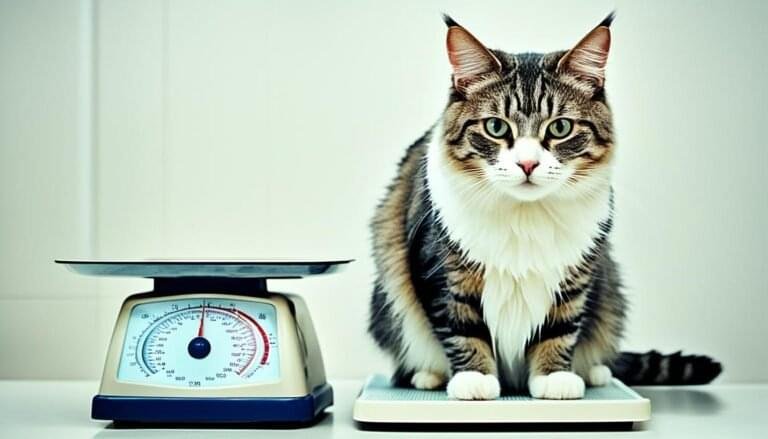




[…] a cat’s nutritional history plays a crucial role in joint health. Diets that lack essential nutrients like omega-3 fatty acids and antioxidants can contribute to […]
[…] or if your cat’s condition worsens despite home care. It’s important to monitor your cat’s health closely and seek appropriate medical attention if needed to ensure a swift and thorough […]
[…] and prolonged discomfort for your feline friend. It’s important to prioritize your cat’s health and ensure they receive the care and attention they […]